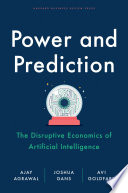

In 'Power and Prediction', the authors delve into how power dynamics are influenced by data and predictive analytics. They argue that power in the modern world is not just about control over resources or people, but increasingly about control over information. This idea highlights the importance of data in shaping decisions and outcomes in various sectors, including politics, business, and social interactions. The book illustrates how organizations leverage data to predict behaviors and trends, thereby gaining a competitive edge. This interplay between power and data signifies a shift in how authority is established and maintained, suggesting that those who can harness data effectively will hold significant power in the future.
Continue readingThe authors explore the growing reliance on algorithms in decision-making processes. Algorithms, powered by vast amounts of data, are increasingly being used to make predictions about human behavior, market trends, and even political outcomes. This reliance raises ethical questions about transparency, accountability, and bias in algorithmic decision-making. The book discusses case studies where algorithmic predictions have led to both positive and negative outcomes, emphasizing the need for critical evaluation of how these tools are employed. It stresses that while algorithms can enhance efficiency and accuracy, they can also perpetuate existing biases if not carefully managed.
Continue readingIn the context of business, the book emphasizes the importance of predictive analytics in shaping strategy. Companies that effectively utilize data to forecast market trends and consumer behavior can position themselves advantageously against competitors. The authors provide insights into how businesses can implement predictive models to enhance decision-making processes, optimize operations, and tailor products to meet consumer needs. This idea underscores the necessity for organizations to invest in data capabilities and develop a culture that embraces data-driven decision-making as a core component of their strategy.
Continue readingThe ethical implications of predictive technologies are a central theme in the book. The authors argue that as organizations increasingly rely on data and algorithms, there is a pressing need for ethical frameworks and governance structures to guide their use. They discuss the potential for misuse of data, invasion of privacy, and the consequences of biased algorithms. The book advocates for a proactive approach to ethics in technology, urging organizations to consider the societal impacts of their predictive tools and to establish accountability measures to mitigate risks.
Continue readingThe book also examines how the rise of predictive analytics is transforming the workplace. As organizations adopt data-driven approaches, the nature of work is changing, with an increasing emphasis on skills related to data analysis and interpretation. The authors discuss the implications for workforce development, including the need for continuous learning and adaptability. They highlight the importance of fostering a data-literate workforce that can leverage predictive insights to drive innovation and efficiency, ultimately reshaping the future of work.
Continue readingThe authors explore how predictive analytics can be applied to understand and influence social dynamics. By analyzing social data, organizations can gain insights into public sentiment, social movements, and community behaviors. The book discusses how these insights can be used by governments, NGOs, and businesses to engage effectively with communities and address social issues. This idea emphasizes the potential for predictive analytics to foster positive social change, while also cautioning against the risks of manipulation and exploitation of social data.
Continue readingFinally, the book addresses the shifting balance of power in society as predictive technologies become more prevalent. The authors argue that those who control data and predictive capabilities hold significant power, potentially leading to inequalities in access and influence. They discuss the implications for democracy, governance, and social equity, advocating for a more equitable distribution of data resources. This idea calls for a critical examination of how power dynamics are evolving in a data-driven world and the responsibilities that come with wielding predictive power.
Continue readingThe reading time for Power and Prediction depends on the reader's pace. However, this concise book summary covers the 7 key ideas from Power and Prediction, allowing you to quickly understand the main concepts, insights, and practical applications in around 23 min.
Power and Prediction is definitely worth reading. The book covers essential topics including The Interplay of Power and Data, The Role of Algorithms in Decision Making, Predictive Power in Business Strategy, providing practical insights and actionable advice. Whether you read the full book or our concise summary, Power and Prediction delivers valuable knowledge that can help you improve your understanding and apply these concepts in your personal or professional life.
Power and Prediction was written by Ajay Agrawal, Avi Goldfarb, Joshua Gans.
If you enjoyed Power and Prediction by Ajay Agrawal, Avi Goldfarb, Joshua Gans and want to explore similar topics or deepen your understanding, we highly recommend these related book summaries:
These books cover related themes, complementary concepts, and will help you build upon the knowledge gained from Power and Prediction. Each of these summaries provides concise insights that can further enhance your understanding and practical application of the ideas presented in Power and Prediction.